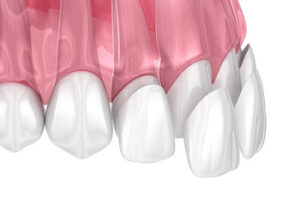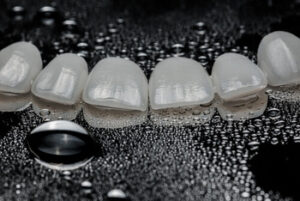Dental veneers present a versatile solution for addressing diverse cosmetic concerns when considering smile enhancement. Whether it’s chipped teeth or discoloured enamel, veneers have the potential to revolutionise your smile and elevate your confidence. This guide will explore the available types of veneers, encompassing porcelain and composite resin options, aiding in discerning which aligns best with your unique needs.
Understanding Dental Veneers
Dental veneers are meticulously crafted thin shells tailored to fit snugly over the front surface of your teeth. Engineered to emulate the look of natural tooth enamel, they seamlessly enhance your smile, exuding a natural appearance. Veneers serve as a versatile solution for an array of cosmetic concerns, from stained and chipped teeth to those that are misshapen, delivering a smile that’s both flawless and authentic.
Procedure:
The process of getting veneers involves several steps:
- Consultation: You’ll discuss your goals with your dentist during your initial consultation. They’ll evaluate your oral health and determine if veneers are the right option.
- Preparation:
- Impressions: Your dentist will then take impressions or digital scans of your teeth, which are precise blueprints for crafting custom-made veneers. These impressions ensure that the veneers are meticulously tailored to match your natural teeth’ size, shape, and colour, resulting in a seamless and harmonious smile transformation.
- Temporary Veneers (if needed): On occasion, temporary veneers may be affixed to safeguard your teeth during the fabrication process of your permanent veneers.
- Placement: Once your permanent veneers are prepared, your dentist will meticulously bond them to your teeth, utilising dental cement. Subsequent adjustments will be undertaken to guarantee an impeccable fit and a seamless, natural appearance.
Overall, getting veneers takes place over several appointments, resulting in a beautifully enhanced smile.
What Are Veneers Made Of?
Veneers are made from porcelain or composite resin. Each material has unique advantages and considerations, which we’ll explore in more detail.
Porcelain Veneers
Porcelain veneers are meticulously crafted from high-quality ceramic material. This material is chosen for its exceptional durability and staining resistance, providing patients with a long-lasting solution for their cosmetic dental needs. A notable characteristic of porcelain veneers is their remarkable ability to closely replicate natural tooth enamel’s appearance. This attribute renders them an optimal choice for individuals desiring a flawless smile that seamlessly harmonises with their natural teeth. Creating porcelain veneers involves precise customisation to ensure a perfect fit and natural appearance.
Due to their durability and aesthetic qualities, porcelain veneers are popular among those looking for a permanent solution to cosmetic dental concerns.
Composite Resin Veneers
Composite resin veneers, in contrast, are crafted from a tooth-coloured composite material. Unlike porcelain veneers, which necessitate multiple dental visits for fabrication and placement, composite veneers can often be applied directly to the teeth in a single visit to the dentist. This makes them a convenient option for individuals seeking immediate cosmetic enhancements to their smile. While composite resin veneers may not offer the same level of stain resistance as porcelain, they still significantly enhance the appearance of teeth. Additionally, composite veneers are typically more economical than their porcelain counterparts, making them a cost-effective choice for individuals on a budget.
To summarise, both porcelain and composite resin veneers present unique advantages and considerations. Porcelain veneers boast exceptional durability, stain resistance, and a natural appearance, making them ideal for those prioritising longevity and aesthetic excellence. On the other hand, composite resin veneers offer a more budget-friendly and convenient option for individuals seeking immediate cosmetic improvements to their smiles. Ultimately, the choice between porcelain and composite veneers depends on the patient’s preferences, budget, and desired outcome.
Pros & Cons of Each Type
Let’s immerse into the pros and cons of porcelain and composite resin veneers:
Porcelain
Pros:
- Stain-Resistance: Porcelain veneers are highly resistant to stains, maintaining their natural appearance over time. This makes them an ideal choice for individuals who consume staining beverages like coffee, tea, or red wine, as well as for smokers.
- Natural Appearance: Porcelain veneers closely mimic the translucency and texture of natural tooth enamel. This results in a seamless blend with the surrounding teeth, creating a beautifully natural-looking smile.
Cons:
- Multiple Dental Appointments: Obtaining porcelain veneers typically involves multiple dental appointments. These include initial consultations, tooth preparation, impressions, and final placement. This extended process may not be suitable for individuals seeking immediate results.
- Higher Cost: Porcelain veneers typically come with a higher price tag compared to composite resin veneers. This is attributed to the utilisation of high-quality materials and the craftsmanship necessary for customisation. While they offer excellent durability and aesthetics, their initial cost may be prohibitive for some patients.
Composite Resin Veneers
Pros:
- Single-Visit Procedure: One of the primary advantages of composite resin veneers is their convenience. Unlike porcelain veneers, which typically entail multiple dental visits, composite veneers can often be applied in a single visit to the dentist. This makes them an attractive option for individuals with busy schedules or those seeking immediate cosmetic improvements.
- Affordability: Composite resin veneers are generally more affordable than porcelain veneers. This makes them a cost-effective choice for individuals on a budget who still desire cosmetic enhancement of their smile.
Cons:
- Less Stain-Resistant: While composite resin veneers enhance the appearance of teeth, it’s important to note that they are not as resistant to stains as porcelain veneers. Over time, exposure to staining substances like coffee, tea, or tobacco may cause discolouration, necessitating more frequent maintenance or replacement.
- May Require More Frequent Replacement: Composite resin veneers may have a different longevity than porcelain veneers. They may require more frequent replacement, which could incur additional costs over time.
In conclusion, both porcelain and composite resin veneers offer distinct advantages and considerations. Porcelain veneers excel in durability, stain-resistance, and natural appearance but require multiple dental appointments and come with a higher initial cost.
In contrast, composite resin veneers offer convenience and affordability. However, they may necessitate more frequent maintenance and replacement. It’s pertinent for patients to carefully consider these factors and seek guidance from their dentist to determine the most suitable option tailored to their individual needs and preferences.
Overview of Traditional Porcelain Veneers: Characteristics, Indications, Maintenance, and Costs
Exploring different types of veneers offers a nuanced understanding of the various options available, each with its unique characteristics and suitability for different dental needs:
Traditional Porcelain Veneers
Overview: Traditional porcelain veneers follow a comprehensive process, beginning with tooth preparation. This involves delicately removing a small amount of enamel to create space for the veneers. Custom-made veneers are then fabricated in a dental laboratory based on impressions of the prepared teeth. These veneers are then permanently bonded to the teeth, providing long-lasting cosmetic enhancement.
Indications
Porcelain veneers are used to correct a variety of dental issues, including chips, cracks, gaps, discolouration, and minor misalignments. They provide a comprehensive solution for improving dental aesthetics, often transforming a smile dramatically.
Maintenance
Maintaining porcelain veneers involves regular dental hygiene practices such as brushing, flossing, and routine dental check-ups. Although porcelain is stain-resistant, it is advisable to avoid excessive consumption of stain-inducing substances like coffee, tea, and red wine.
Cost
The cost of porcelain veneers can be relatively high compared to other cosmetic dental treatments, reflecting the material’s quality and the customised process of fabrication and application. The investment is often justified by the significant improvement in dental appearance and the long-lasting nature of the treatment.
Advantages of Veneers
Regardless of the type of veneers you opt for, there are several advantages to this widely favoured cosmetic dentistry treatment.
Improved Aesthetics
Veneers are highly effective in enhancing the overall appearance of your smile. They can address a wide range of dental imperfections, including chips, cracks, stains, and misalignments. By concealing these flaws, veneers help create a more symmetrical, balanced, and aesthetically pleasing smile.
Natural-Looking Results
A primary advantage of veneers is their capacity to yield natural-looking results. Whether you opt for porcelain or composite resin veneers, both materials undergo meticulous crafting to emulate the colour, clarity, and texture of natural tooth enamel. This guarantees that your smile retains its innate appearance while attaining the desired cosmetic enhancements.
Durable and Long-Lasting
Veneers are celebrated for their durability and enduring quality. With diligent care and regular maintenance, veneers have the potential to endure for many years, offering a long-lasting solution for addressing cosmetic dental concerns.
Porcelain veneers, specifically, exhibit exceptional resistance to stains and damage, rendering them a durable choice for patients pursuing long-term cosmetic enhancement.
Enhanced Confidence
Improving your smile with veneers can profoundly boost your self-confidence and self-esteem. With a revitalised smile, you may feel more at ease and confident in various social and professional settings, knowing that your smile radiates its utmost beauty. This enhanced confidence can have positive effects on various aspects of your life, including relationships, career opportunities, and overall well-being.
Minimally Invasive
Depending on the type of veneers chosen, the procedure can be minimally invasive. For example, porcelain veneers require little to no tooth preparation, preserving the natural structure of your teeth. This means less discomfort and a shorter recovery time compared to more invasive dental procedures, such as dental implants or orthodontic treatments.
Versatility
Veneers present a versatile solution for addressing a broad range of cosmetic dental concerns. Whether you seek to rectify minor imperfections or embark on a complete smile transformation, veneers can be customised to align with your specific needs and aesthetic preferences. They can be applied to individual teeth or across multiple teeth to achieve a comprehensive smile makeover.
In summary, veneers provide numerous advantages, including enhanced aesthetics, natural-looking results, exceptional durability, boosted confidence, minimally invasive procedures, and adaptability in addressing various cosmetic dental issues. Whether you seek to rectify minor flaws or embark on a total smile rejuvenation, veneers offer a dependable and effective solution for enhancing both your smile and overall appearance.
Frequently Asked Questions
Curious about veneers? Check out our FAQs section for answers to commonly asked questions about the cost, procedure, and maintenance.
Q: How much enamel is removed during the veneer procedure?
Q: Are veneers reversible?
A: Although veneers are generally viewed as a permanent cosmetic solution, they can indeed be removed and replaced if needed. However, it’s important to note that this process may entail additional tooth preparation and dental procedures.
Q: How long do veneers last?
A: With proper care and maintenance, veneers can last for 10-15 years or more. Regular dental check-ups and adherence to good oral hygiene practices play vital roles in extending the lifespan of your veneers.
Q: Can veneers be whitened?
A: Due to their stain-resistant nature, veneers cannot be whitened in the same manner as natural teeth. Nevertheless, professional cleaning and polishing administered by a dentist can aid in preserving the brightness of your veneers.
Conclusion
In conclusion, the array of veneer options provides a versatile solution for attaining a flawless smile. Whether you opt for porcelain or composite resin veneers, you can anticipate enduring results and heightened confidence in your appearance.
If you’re contemplating veneers as a component of your cosmetic dentistry journey, we urge you to arrange a consultation with your local dentist. By discussing your options, you can embark on the path to a more confident smile without delay.
Don’t hesitate to transform your smile and elevate your confidence with veneers. Schedule a consultation with us today to explore your options and embark on your journey towards a more radiant smile!
Contact MyHM Dentist at 02 9158 6379 to claim the smile of your dreams!
References:
https://www.healthline.com/health/dental-veneers#benefits
https://my.clevelandclinic.org/health/treatments/23522-dental-veneers
https://www.webmd.com/oral-health/veneers
https://www.colgate.com/en-gb/oral-health/veneers/what-is-porcelain-veneer-and-how-to-care-for-them
https://www.forbes.com/health/dental/composite-veneers/








